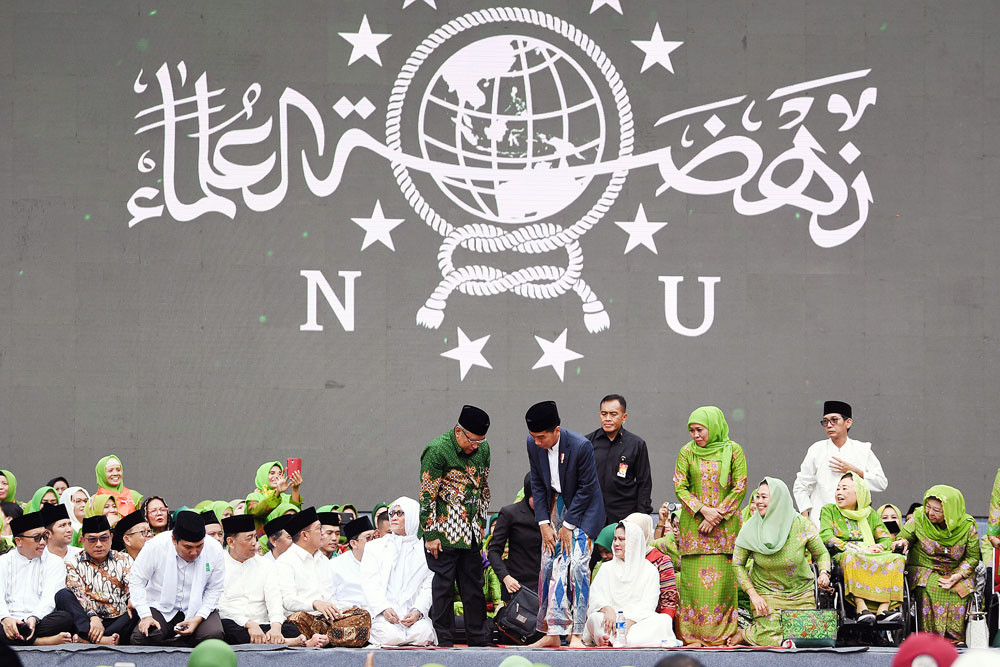Popular Reads
Top Results
Can't find what you're looking for?
View all search resultsPopular Reads
Top Results
Can't find what you're looking for?
View all search resultsRival camps woo different women's groups
Women make up the largest voting bloc in the 2019 general elections.
Change text size
Gift Premium Articles
to Anyone
A
s voting day draws near, the presidential candidates, incumbent Joko “Jokowi” Widodo and challenger Prabowo Subianto, have stepped up their campaigns to lure women voters, a coveted demographic group for the 2019 elections.
Women voters make up a little more than half of the total electorate according to data from the General Elections Commission (KPU). Of the total 192.8 million eligible voters listed, 96.5 million are female while the remaining 96.2 are male. Apart from the large number, female voters, specifically middle-aged women, are also deemed important because of their influence over their environment, analysts say.
Ever since the campaign period kicked off in September, different women's groups have expressed support for either Jokowi or Prabowo.
The most recent expression of support was made during a gathering of more than 100,000 members of Muslimat, the women's wing of the nation's largest Islamic organization, Nahdlatul Ulama (NU), which was also attended by the President on Sunday in Jakarta.
Among the high-profile women who attended the event was Yenny Wahid, the daughter of former president and NU leader Abdurrahman "Gus Dur" Wahid, who publicly stated: "I am a [member] of Muslimat and I personally support Jokowi."
Muslimat chairwoman Khofifah Indar Parawansa, a former minister in Jokowi's Cabinet and a politician of the National Awakening Party (PKB), a member of Jokowi's coalition, also expressed support for Jokowi.
"It is safe to say that Jokowi has secured more support from women with deep-rooted traditional networks in society compared to his rival Prabowo," said Arie Sujito, political analyst from the Yogyakarta-based Gadjah Mada University (UGM).
"These [women] have been active for quite a long time in organizations that have a stronger traditional base in the grassroots," Arie said. "[Muslimat] itself has a great influence because it addresses both women’s and religious issues."
Khofifah, who led the Muslimat members in a declaration against hoaxes and hate speech during Sunday's gathering, is also the governor-elect of East Java, a traditional base of NU.
In September, Yenny officially announced the support of Gus Dur's family for Jokowi and his running mate Ma'ruf Amin, who was formerly NU’s supreme leader, in the 2019 elections.
NU Online, the organization's official news site, claimed Muslimat NU has about 32 million members across the country and abroad. A 2017 study by the Alvara Research Center estimated that about 79.04 million people were affiliated with the NU in the Muslim-majority country.
Jokowi and Khofifah stopped briefly and smiled when asked on Sunday whether Muslimat would officially back the incumbent against Prabowo, while Yenny gave a vague answer: "There are many members affiliated to NU and Muslimat feels [closer] to Pak Jokowi."
One the other hand, the well-known female supporters of Prabowo and Sandiaga Uno’s camp are groups whose members identify themselves as housewives and who focus on protesting against the rising prices of staple food and basic needs under Jokowi's administration.
Among the groups are the Housewives Party in Support of Prabowo-Sandiaga (PEPES), the Militant Housewives’ Force (BEM) and the Voluptuous Housewives Who Fight for Prabowo-Sandi (ESPAS).
The camp has also accommodated the groups by launching the Housewives’ Party’s website, which was to serve as a platform for female supporters, in November.
Prabowo said during the first presidential debate that the most militant supporters of his ticket are the groups of housewives across the country. “We open opportunities as wide as possible for housewives to make moves.”
Indonesian Institute of Science (LIPI) political analyst Siti Zuhro said that the so-called housewives’ movement was heterogeneous in nature and it served as a uniting force for housewives who are in charge of managing the basic needs of their households.
The women felt that Prabowo and Sandiaga understood their concerns over rising prices and were probably charmed by Sandiaga’s much talked-about appearance, Siti said.
"We can't say that [the housewives’ groups] are more dominant, but Prabowo and Sandiaga’s campaign for lowering prices of staple food and basic needs has gained traction among those who identify themselves as housewives,” Siti said.
Arie, however, said the presidential candidates must realize that Indonesian women were also divided by social class and the areas in which they lived.
“The key to win their hearts was to be able to choose the right issues for each targeted segment. Other issues such as education for children, reproductive health, family protection and equality in the workforce, for example, are among the important issues for women in the middle- to higher-income classes," he said.










